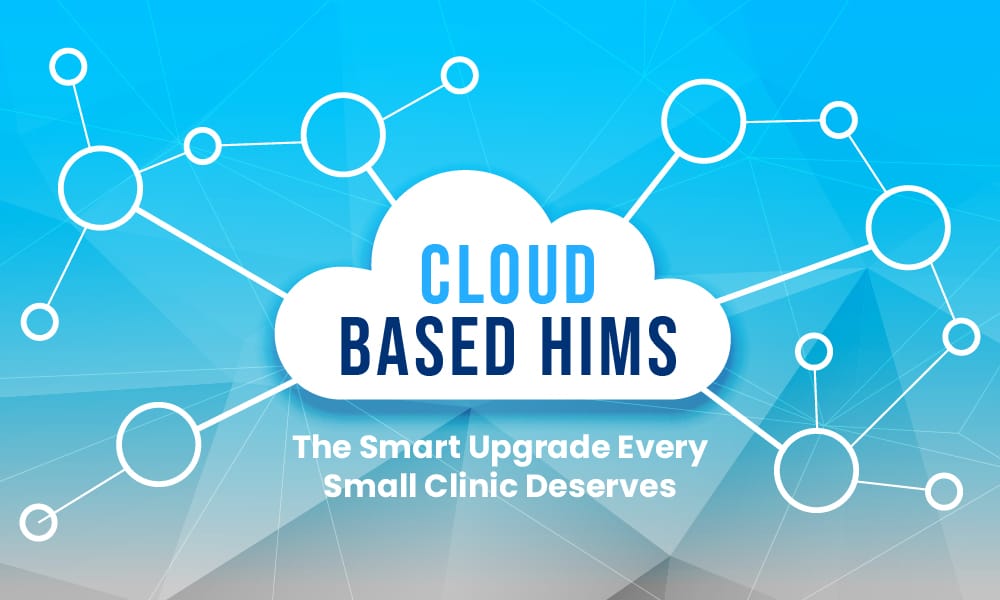
Small clinics face mounting pressure to deliver exceptional patient care while controlling costs and keeping operations smooth. Traditional systems—whether paper-based or on-premise—often slow things down, limit accessibility, and drain resources. That’s where a cloud hospital management system steps in to revolutionise operations.
By combining artificial intelligence (AI) with cloud technology, HIMS for small clinics offers a centralised, real-time platform that simplifies patient record management, billing, inventory control, and scheduling. Cloud-based clinic software empowers doctors and administrators to focus on patient outcomes rather than paperwork. Clinics worldwide are adopting these solutions not just to survive but to thrive in an increasingly competitive healthcare environment.
The Challenges of Traditional Clinic Management Systems
Small clinics worldwide are under increasing pressure to deliver quality healthcare while maintaining cost efficiency. However, many still rely on outdated systems and manual processes that slow down operations, increase errors, and hinder patient satisfaction. In a competitive healthcare market, these inefficiencies can prevent clinics from meeting patient expectations and achieving sustainable growth.
Understanding these challenges is the first step toward adopting more advanced solutions such as a cloud based hospital management system or other small clinic software solutions that can streamline operations.
• Manual Processes That Slow Down Patient Care
Paper records and outdated software force doctors to spend valuable time searching for files or entering the same data repeatedly. This reduces time available for patient interaction and delays diagnosis and treatment. Patients often grow frustrated when appointments take too long, while manual scheduling can cause double bookings or missed appointments—further damaging the patient experience.
• Data Fragmentation and Poor Collaboration
In many small clinics, patient data is spread across physical files, standalone billing tools, and separate lab systems. Without an integrated small clinic software solution, staff cannot update or share information instantly. This creates communication gaps, results in repeated diagnostic tests, and increases the risk of medical errors.
• High IT Costs and Maintenance
On-premise systems require costly servers, storage solutions, and constant updates. For clinics with limited budgets, maintaining IT staff is often unrealistic. These systems are also vulnerable to hardware failures and natural disasters, leading to data loss and higher operational costs with a poor return on investment.

What Makes Cloud-Based HIMS the Smarter Choice for Small Clinics
A cloud hospital management system lets doctors, nurses, and administrators access patient data from any device with internet connectivity. This flexibility supports telemedicine, home care visits, and multi-location practices. When patient records update in real time, decisions become faster and more accurate.
• Scalability Without Extra Hardware
HIMS for small clinics scales as the clinic grows. Whether a practice serves 50 patients daily or expands to 500, the system adjusts automatically without costly server upgrades. Clinics can add new features or modules without downtime.
• Reduced Operational Costs
Shifting to cloud-based clinic software eliminates the need for bulky hardware and reduces IT maintenance costs. Subscription-based pricing makes it easier to manage expenses and ensure predictable budgeting—making it an affordable HIMS for doctors at any stage of growth.
AI-Driven Advantages of Cloud-Based HIMS
Small clinics across the world are under increasing pressure to improve efficiency, reduce operational costs, and deliver higher-quality patient care. Implementing a cloud hospital management system with AI capabilities gives them the edge they need to meet these demands.
By combining advanced data analytics with real-time access, HIMS for small clinics transforms how doctors, administrators, and support staff operate. This intelligent approach not only streamlines daily tasks but also empowers clinics to make data-driven decisions, ensuring better patient outcomes and sustainable growth.
• Automated Appointment Scheduling
AI-powered scheduling in cloud-based clinic software analyses patient flow patterns and recommends optimal time slots. This reduces wait times, minimises no-shows, and frees doctors from manual scheduling, allowing them to focus on patient care.
• Smart Diagnostics Support
Integrated with lab results, imaging data, and patient history, the AI in small clinic software solutions highlights potential concerns instantly. Clinics without specialist staff benefit greatly, as doctors can make timely and informed diagnoses.
• Predictive Inventory Management
By analysing historical usage and upcoming appointments, AI in an affordable HIMS for doctors predicts medicine and supply needs. This eliminates both overstocking and shortages, ensuring smooth operations.
• Intelligent Data Analytics
Advanced analytics within the cloud hospital management system provide insights into patient demographics, recurring health trends, and revenue performance. Clinic leaders can identify growth opportunities, streamline processes, and improve ROI.
When small clinics adopt AI-driven cloud-based clinic software, they gain a powerful toolset that drives efficiency, enhances patient satisfaction, and ensures competitiveness in a rapidly evolving healthcare landscape.
Key Features That Empower Small Clinics Globally
In today’s competitive healthcare environment, small clinics must operate with the same level of efficiency and precision as larger hospitals. Limited staff, budget constraints, and increasing patient expectations mean that technology plays a critical role in daily operations. Adopting an AI-powered cloud run hospital management system gives small clinics the edge they need to streamline workflows, reduce administrative burdens, and improve patient satisfaction.
By integrating core healthcare and administrative functions into a single platform, HIMS for small clinics ensures that every department works in sync. The following key features show how cloud-based clinic software empowers small healthcare providers worldwide.
• Centralised Patient Records
A cloud hospital management system stores every patient’s medical history, prescriptions, test results, and treatment records in one secure, centralised database. This eliminates the inefficiency of handling scattered files and ensures complete accuracy in patient information. Instant access allows doctors and staff to retrieve and update records in real time. For clinics with multiple branches, centralised data ensures smooth coordination and continuity of care across locations.
• Seamless Billing and Insurance Integration
HIMS for small clinics automates the entire billing process while integrating with major insurance providers. Automated claim submissions speed up approvals, reducing payment delays. Patients benefit from transparent and error-free billing, while clinics enjoy faster cash flow and reduced administrative overhead.
• Telemedicine and Remote Consultations
Modern small clinic software solutions include telemedicine features that allow clinics to extend services beyond physical boundaries. Secure video consultations, encrypted messaging, and online prescription services help doctors treat patients who cannot visit in person, creating new opportunities for patient engagement and revenue generation.
• Regulatory Compliance Made Easy
Cloud-based clinic software updates automatically to meet the latest healthcare regulations, including HIPAA, GDPR, and country-specific mandates. This built-in compliance minimises legal risks, safeguards patient privacy, and ensures that clinics operate within the required standards without additional manual effort.
By adopting these features, small clinics gain not just technology but a strategic advantage—making operations smoother, patient care faster, and compliance effortless while staying cost-efficient with affordable HIMS for doctors.

How Cloud-Based HIMS Improves ROI for Small Clinics
For small clinics aiming to grow while keeping costs under control, adopting a cloud hospital management system can deliver measurable returns. An AI-powered HIMS for small clinics streamlines daily operations, optimises resources, and enhances patient experiences—directly contributing to higher revenue and efficiency.
• Faster Patient Turnaround
With cloud-based clinic software, scheduling becomes seamless, billing speeds up, and patient records are instantly accessible. Clinics can serve more patients daily without sacrificing care quality.
• Lower Overhead Costs
Replacing on-premise systems with an affordable HIMS for doctors cuts hardware, energy, and IT staffing expenses. Subscription-based pricing ensures predictable budgeting and healthier cash flow.
• Improved Patient Retention
Shorter wait times, accurate diagnoses, and smooth billing encourage patients to return and recommend the clinic. Small clinic software solutions not only increase satisfaction but also build long-term loyalty.
Global Adoption: Why Clinics Worldwide Are Deploying Cloud-Based HIMS
• Standardised Operations Across Multiple Locations
A chain of clinics in different cities or countries can standardise processes and ensure consistent quality using a single cloud hospital management system. This uniformity improves patient trust and brand reputation.
• Data-Driven Decision Making
AI-powered reports highlight trends in patient visits, seasonal disease patterns, and financial performance. Leaders can use these insights to optimise staffing, marketing campaigns, and resource allocation.
• Competitive Edge in a Digital Healthcare Era
Digital transformation in healthcare is no longer optional. Clinics that adopt HIMS for small clinics stand out by offering faster services, innovative patient engagement tools, and greater accessibility compared to competitors using outdated systems.
Choosing the Right Cloud-Based HIMS for Your Clinic
Selecting the best cloud hospital management system is one of the most crucial decisions a small clinic can make. The right solution not only streamlines operations but also enhances patient care, improves staff efficiency, and boosts overall clinic profitability. For clinics aiming to stay competitive in a digital-first healthcare environment, investing in HIMS for small clinics that aligns with current needs and future growth plans is essential. Below are the key factors to consider when making this choice.
• Scalability and Customisation
Choose a cloud-based clinic software that adapts as your clinic grows. Whether you plan to add more doctors, expand into multiple locations, or introduce specialised services, the system should allow the seamless addition of new modules like pharmacy management, dental records, or speciality care features without causing downtime. Flexible small clinic software solutions ensure you invest once and benefit for years.
• Security and Data Privacy
Patient data is highly sensitive, and protecting it is non-negotiable. Opt for an affordable HIMS for doctors that provides advanced encryption, multi-factor authentication, and compliance with healthcare privacy regulations such as HIPAA or GDPR. A secure small clinic software solution not only safeguards information but also strengthens patient trust—a critical factor for long-term loyalty.
• Integration Capabilities
The best cloud hospital management system works effortlessly with your existing tools, such as lab management software, pharmacy inventory systems, and accounting platforms. This level of integration minimises duplicate data entry, reduces errors, and keeps workflows smooth. HIMS for small clinics with strong integration capabilities ensures every department functions in harmony, delivering a unified and efficient healthcare experience.
By focusing on scalability, security, and integration, small clinics can choose a cloud-based clinic software that drives growth, maintains compliance, and keeps both patients and staff satisfied.
Case Study: Transforming a Multi-Branch Clinic Network
A small healthcare group operating in Southeast Asia implemented an affordable HIMS for doctors across five branches. Within six months, they reduced billing errors by 45%, increased daily patient volume by 30%, and cut administrative costs by 25%. Centralised data access allowed them to deploy telemedicine services for rural patients, expanding their reach and revenue.
Impact of Cloud-Based HIMS on Multi-Branch Clinic Performance
| S.NO | Key Metrics | Implementation Impact |
| 1 | Billing Error Reduction | 45% decrease in billing errors across all branches |
| 2 | Increase in Daily Patient Volume | 30% increase in the number of patients seen daily |
| 3 | Administrative Cost Reduction | 25% reduction in overall administrative costs |
| 4 | Telemedicine Deployment | Enabled access to rural patients, expanding reach and revenue |
This table highlights the remarkable transformation achieved by a multi-branch healthcare group in Southeast Asia after implementing an affordable HIMS for doctors across five branches. By leveraging centralised data access and advanced automation, the clinic reduced billing errors by 45% and increased daily patient volume by 30%, directly improving service capacity.
Administrative costs dropped by 25% due to streamlined workflows. Additionally, the deployment of telemedicine allowed the clinic to reach rural patients, expanding both its service coverage and revenue streams. This case demonstrates how adopting a cloud based hospital management system can deliver measurable improvements in efficiency, patient care, and profitability.
The Future of Small Clinics Is in the Cloud
Small clinics worldwide can no longer afford to rely on outdated systems. An AI-powered cloud hospital management system offers cost efficiency, scalability, and innovation. With benefits like predictive inventory, smart scheduling, and secure patient record management, HIMS for small clinics positions healthcare providers for long-term success.
By adopting cloud-based clinic software, small practices gain the tools to compete with larger hospitals, deliver superior patient experiences, and adapt quickly to changing healthcare demands. The future belongs to clinics that embrace technology—those that invest in small clinic software solutions today will define the standard of care tomorrow.





